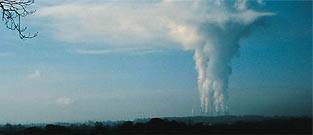Funny Weather
IMC Cambridge | 11.07.2004 19:03 | Ecology | Cambridge
Have you noticed that we don't seem to get seasons any more, just weather ...
Does it make you wonder what's going on? It's July, and we have cold nights, storms, showers. Is it just more bad weather, or is it another sign of climate change?
Hold on a minute. Wasn't this whole global warming thing meant to lead to long hot summers? Vineyards and orange groves in the south of england. No one said anything about storms ...
Sorry to disillusion you, but as the temperature rises, there is more and more energy in the global weather system. And more energy leads to more extreme weather - high winds, heavy downpours and severe storms.

Get involved [ Rising Tide | Stop Esso | No New Oil ]
Glastonbury and Wimbledon washed out? That's nothing new I hear you say. And of course, no single weather event can be put down to climate change, the causal links are far too complex. But looking at the patterns and statistics as the years go by is pretty convincing. In the 1960s there were 16 climate related disasters. In the 1990s there were 70. Between 2000 and 2020 another 245 large disasters are predicted. Meanwhile, the University of Bern recently reported that last summer was the hottest in 500 years .
Doesn't sound like random variation to me.
Computer predictions estimate global temperature increases over the next 100 years of across the world by up to 6°C. Scientists know of no time when temperatures have risen faster, and beyond a 2°C increase find it hard to make reliable predictions of the actual effects in the weather. In the next fifty years we will see ever increasing extremes of weather. More storms, floods, droughts. Sea level rise will accompany the temperature rise, mainly due to thermal expansion of water and melting of mountain glaciers. 20cm to 1m are forecast in 100 years.
And it could be much worse. There are some huge unknowns out there. Scientists have identified some possible scenarios which make their main forecasts look rather minimal. Levels of carbon dioxide emissions are presently rising even faster than the "business as usual" forecasts. This could lead to a 10-14°C rise over major land masses by 2100.
And then there's the really scary possibility that as the oceans get warmer, currents such as the gulf stream could slow down or even stop. This leads to less nutrients being available to the phytoplankton which lock up billions of tons of carbon a year. And if temperature rises start getting out of control, well, warmer seas won't hold so much carbon dioxide ... positive feedback with somewhat serious consequences for the future of human civilisation.
Climate change is a far bigger threat than global terrorism. Don't take my word for it. Tony Blair's chief scientific advisor, Sir David King has said "This is the biggest issue for us to face this century. It's manmade. The science is done. It's complete. It's a matter of political understanding." Similarly, Hans Blix, the UN's chief weapons inspector has said "To me the question of the environment is more ominous than that of peace and war. We will have regional conflicts and use of force, but world conflicts I do not believe will happen any longer. But the environment, that is a creeping danger. I'm more worried about global warming than I am of any major military conflict."
Of course, there are some dissenting voices. Mostly connected to the big oil companies. ExxonMobil, owners of Esso, are the worst. They have set out to wreck the Kyoto treaty at every step, using a variety of dirty tricks . One of the most illuminating is a widely discredited petition by "17,000 scientists" to dismiss the scientific consensus on global warming. Some of the supposed "scientists" on the petition included characters from the TV show M*A*S*H and one of the Spice Girls!
So what the hell are we going to do about it? The Kyoto treaty is a start, though rather a poor one. The reductions are completely inadequate. But to achieve a change from emissions rising to going down at all would be a huge achievement. Once the direction has changed, we can increase the speed of reductions. Ultimately, contraction and convergence will be the way to go. Reducing our emissions to a level where each human has the same carbon allowance each year, whichever country they are from.
So reduce your own emissions, get out and campaign and kick up a stink about this. We need the public to know quite how scary climate chaos is going to be. We need to stop new oil, gas and coal developments. We've got enough already. We need renewable energy, and we need to use less energy. We need to tax fuel for aircraft. And we need to involve all people in the achievement of climate justice - particularly those most affected in the ‘global south’.

Useful links:
- Rising Tide campaigns against climate change and have great campaign and practical ideas and a PDF guide to cutting domestic consumption.
- The Campaign Against Climate Change based in London.
- No New Oil - dismantling the oil economy.
- Climate Justice.
- Stop Esso - the worst of the climate change deniers.
- Contraction and convergence is put forward by the Global Commons Institute.
- Looking for a simple guide to the scientific details of climate chaos. One of the best guides I've seen is "everything you didn't want to know about climate change but probably should find out" by cartoonist Kate Evans.
- Hard science information can be got from UEA's Climate Research Unit or from the horse's mouth - the Intergovernmental Panel on Climate Change. The UK centre for climate research is the Hadley Centre .
IMC Cambridge